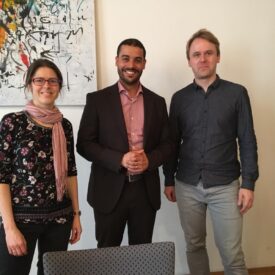“Housing for Refugee Inclusion” took place within the framework of the SHARE Network, the ARGE consortium, consisting of Caritas Austria, Rotes Kreuz Oberösterreich and Diakonie Flüchtlingsdienst, in partnership with the Brussels office of the International Catholic Migration Commission (ICMC Europe). The conference aimed to provide an overview of the various housing models across Europe and to serve as a platform for exchange of best practices. The ARGE consortium presented the housing models in practice in Austria, while Housing Europe and other NGOs presented an overview of their work on housing for refugees’ inclusion.
The conference included panel presentations of good practices, interactive working groups and a study visit in Vienna. The event was a great opportunity for Housing Europe to share its members’ good practices both in Austria and across Europe as well as recommendations, widely shared lessons learned and challenges in the concluding remarks.
To sum up of the main takeaways:
The main challenges that vulnerable people face are quite similar for NGOs, humanitarian organizations and International Organizations. All agreed that the process of integration requires more than merely shelter as well as more funding opportunities.
There is a need to build on good practices and lessons learned in order to tackle the negative perception of migrants and refugees due to populist discourse. Successful projects from across Europe that were showcased during the prove that what is equally important is to build a sense of community. This means putting in place long-term, meaningful support, in cooperation with a range of stakeholders: local authorities, employment and training services, care and healthcare providers, associations and inhabitants both of migrant and non-migrant background.
Additionally, there is a gap in the transition from temporary to permanent accommodation due to lack of information, discrimination and long waiting time, depending on the area. Due to the negative representations of migrants and refugees, the local community is reluctant and suspicious about newcomers. This can come in many forms, such as the refusal of accommodation by private property owners, imposing restrictive conditions or criteria limiting access to publicly supported accommodation.
Moreover, there is a severe problem of housing quality, for example in the presented cases of Amsterdam and Bradford. There is a housing shortage and mismatch between rural and urban areas. In a nutsell, cities are the main destination for single refugees, which implies complications in access to decent housing and job opportunities. Rural realities are “cosy” and manageable in terms of figures, suitable for extended family units, thus newcomers receive better support. Despite the perception that “Small places have big hearts”, the limit here is that language courses are normally found only in cities.
Finally, the study visit to Zinnergasse shows that creating social mix in the housing estates and the neighbourhoods is key to avoiding socio-spatial segregation, and residents including migrants and vulnerable people should be able to shape the kind of community they want to live in by participating in the design and implementation of new initiatives.
Often people living in social housing neighbourhoods are more familiar with and ready to accept differences between people. It’s important to work with citizens to build a collective image/story, reflecting on how cities and neighbourhoods were built through immigration.
It is possible to view migrants as an opportunity to make the local area more attractive, in terms of the diversity and skills they bring, concluded the session.
Visiting GBV
Abderrahim Khairi, our Membership Officer, used the occasion of the trip to Vienna to meet Gerlinde and Gerald from The Austrian Federation of Limited-Profit Housing Associations (GBV) in their office. The meeting took place on Friday afternoon, straight after the conference to understand the Austrian Housing System and, from a Membership prospective, to inquire how Housing Europe could cooperate even better with GBV.
The meeting was also an opportunity to discuss the GBV recent projects such as 5 euro-housing in Tirol and Vienna Urban development area, Hauptbahnhof sonnwendviertel.

